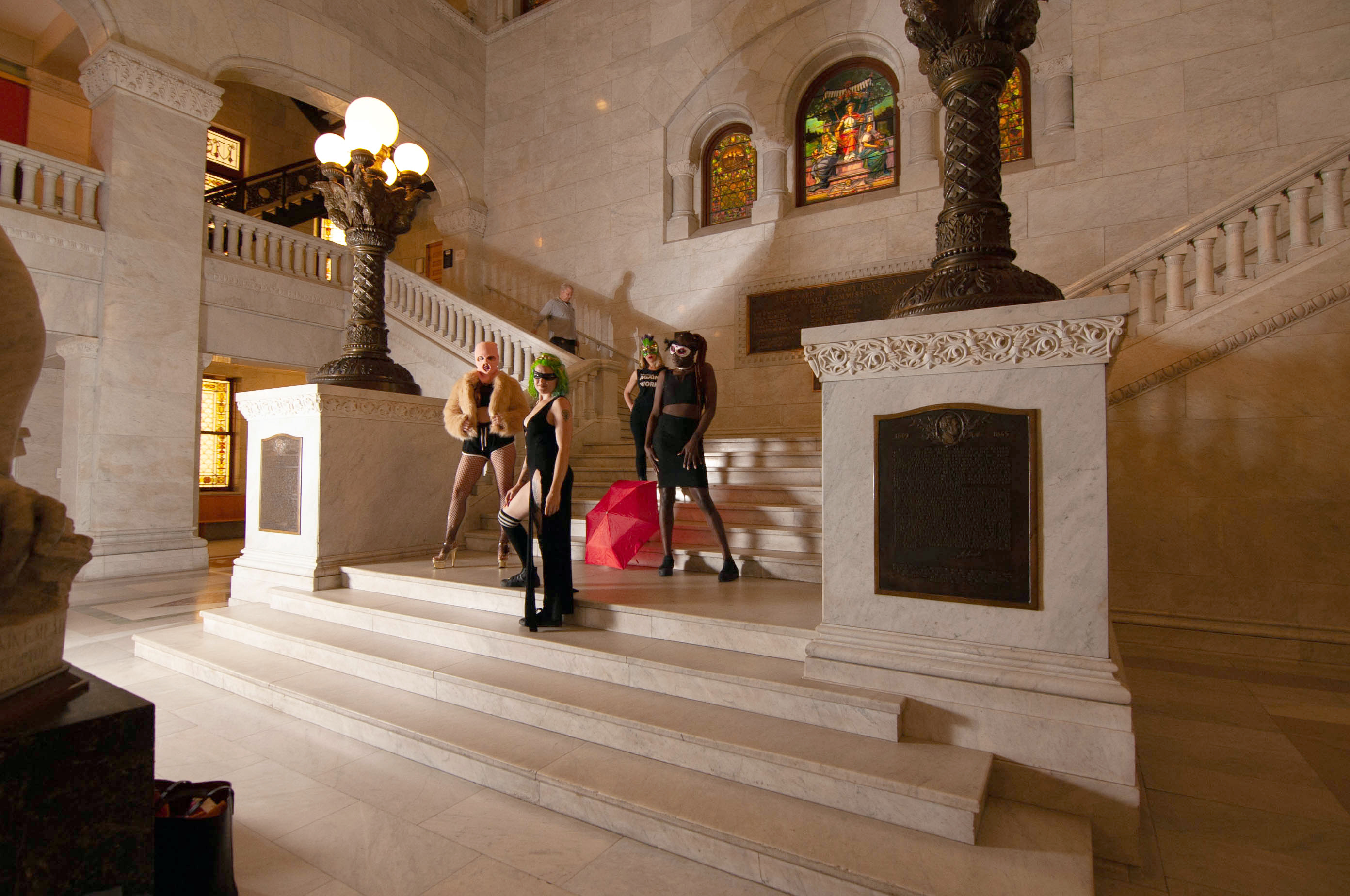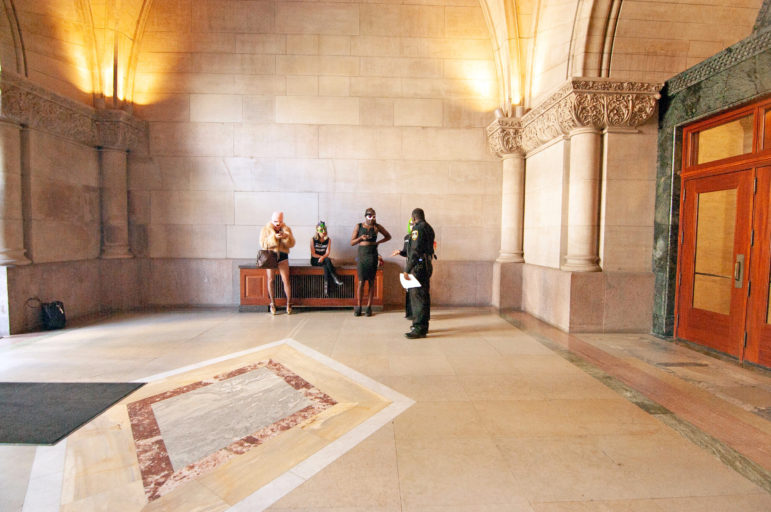

Share
When we became aware that the Minneapolis City Council was exploring new regulations for adult entertainment businesses, we were skeptical. The bipartisan quest to eradicate sex work has endangered the lives of workers and left us with increasingly fewer legal and safer venues in which to work. We didn’t know if we were going to have to fight the city, the feminists, the anti-trafficking establishment, the corporate clubs and their lawyers, the feds, or all of ’em. All we knew is that we were gonna fight, and that we had nothing to lose.
We are the Sex Workers Outreach Project (SWOP), and we are a non-hierarchal, consensus-based, autonomous chapter of a national organization that advocates for the human rights of people in the sex trades. We view ourselves as part of the broader coalition of prison abolition and anti-state violence work.
We were ready to fight, so we were pretty shocked to find meaningful collaborators in city government and non-governmental organizations, to be welcomed, and to be taken seriously. We have now been quietly working with the city for almost two years to pass regulations that will advance workers’ rights.
In the fall of 2017, the City of Minneapolis Health Department conducted inspections of all seventeen adult entertainment establishments in the city. Dancers were freaked
Following the release of UROC’s report, the City Pages published an article that was very stigmatizing. They portrayed strip clubs to be a gross public health hazard. We were upset to be represented this way, but it also brought our attention to the UROC report. The UROC report was more nuanced. Parts of the report touched on the financial abuses happening in strip clubs, and we thought that was the real story. We wanted to highlight this problem, so we partnered with Dr. Eric Sprankle of Minnesota State University to conduct our own needs assessment: The Real Stripper Report.
Our intention when we started the Real Stripper Report was to arm ourselves with data. Fifty-eight dancers from all the strip clubs in Minneapolis responded to an online survey asking questions about health and safety, financial practices, contracts, and other work-related concerns. Thirty-three participated in longer interviews about the issues they faced at work. The interviews were enlightening, and many dancers thanked us for asking them about the challenges they face. Sex workers often feel like no one cares about them.
The first time SWOP met with Dr. Martin’s team at UROC was tense; both sides were nervously anticipating a conflict. Almost everyone at that table had come through the Gender, Women’s and Sexualities Studies (GWSS, pronounced gee whiz) department, some at the University of Minnesota, so we spoke the same language of critical analysis. One thing about us feminists: we might be abrasive, but we can take a critique and improve ourselves. UROC now includes us in all relevant sex work projects they are conducting, and we look forward to continuing this work together.

The recommendations that SWOP made to the City Council were based on the data from The Real Stripper Report. A main concern we took up with the city was that any safety regulations wouldn’t infringe on dancers’ anonymity and that it wouldn’t lead to further surveillance or criminalization of dancers.
We wanted to represent the whole community, so we focused on where dancers had the most consensus. For example, most dancers want to be escorted when leaving the club. We also advocated for a ban on tipping management and owners, which is illegal. Contracts should be accessible to dancers and open to review by the City for actionable consequences to discriminatory behavior by the club owners and managers. SWOP’s and UROC’s studies supported each other, enabling us to make a strong case to the City to adopt a workers’ rights approach.
Council Member Cam Gordon is one of the authors of this ordinance. He has a record of defending labor, and it was easy to reframe this as a workers’ rights issue and move away from the stigmatizing public health perspective. Gordon said that he wanted Minneapolis to do something innovative that benefited the dancers. Dancers have a unique opportunity to be heard and to pull the levers of public service in our favor. If our experiment is a success, it could be a model for improving working conditions in strip clubs around the country.
Dan Huff from the Health Department remained an important ally to the project even though we redirected the focus of this work away from public health and toward labor rights. He consulted us on the language of his recommendations to City Council. He truly believes that everyone deserves a safe and healthy workplace, and we trust that dancers can contact him with their concerns.
We are excited for the health department to able to enforce regular workplace regulations, such as Occupational Safety and Health Administration standards, in the clubs. Enforcement could mean dramatic improvements in the health and safety of our locker rooms, stages, and the areas of the club that are for the dancers—areas that have been criminally neglected for too long.
Access to safe and clean workspaces is an especially dire need, as we have no access to workers’ comp or even sick or personal days since we are falsely classified as independent contractors and thus have no employee benefits.
City collaborators now understand the unique needs and concerns of workers in the live adult entertainment business. With this proposed ordinance, the City is taking a stand for workers and against corporate interests. The process of drafting this ordinance sets a positive precedent for the handling of workplace issues in the adult entertainment industry.
It was perfect timing when Sophia Ek from MPD 150 (a local police abolitionist organization) asked to do a group portrait of SWOP for their “Making It Real: Our History with Police and Our Future Without Them” exhibit. We were in need of celebration. Here we are, standing on the steps of city hall, basking in the victory of being a different type of agitator.
The public hearing for the new ordinance will be at 1:30 on Monday, August 12 in the chambers of Minneapolis City Hall. We need dancers to testify, and we need allies to pack the floor to show support. Wear red!
Andi Snow started dancing in Portland Oregon 15 years ago. she has worked in every club in Minneapolis and in many small towns in Minnesota. She has also danced across the US and internationally. She organizes with the Sex Workers Outreach Project (SWOP) of Minneapolis.

